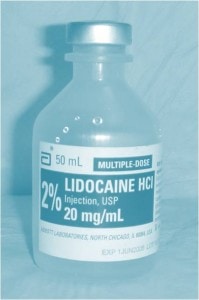Stem Cell Death caused by Common Medications used by Physicians
In yet another study, researchers have again determined that steroid medication and local anesthetics are really bad for cells. Steroid is a strong anti-inflammatory that is commonly used by physicians to treat swelling. The most common steroid medications are Cortisone, Hydrocortisone, Depomedrol, and Betamethasone. Local anesthetics are medications injected by physicians that help numb an area. The most common are Lidocaine, Novacaine, and Marcaine (bupivicane). Several years ago we tested local anesthetics with stem cells in our stem cell culture lab and this experience changed the way we harvest cells. However, we still see fat based stem cell clinics using common liposuction methods to collect stem cells. The problem with the most common aspiration method for fat liposuction is the use of large amounts of stem cell killing local anesthetic infiltrated into the adipose tissues. While this helps with patient comfort and the technique is easy and straightforward for the doctor, since the doctor has no idea about the viability of the cells being harvested, he has no way of knowing if he is killing the cells with the anesthetic. As discussed, several years ago we investigated the effects of these anesthetics with stem cells after we began to notice that certain harvest techniques used by certain clinic doctors would lead to much lower stem cell yields in culture. In addition, we began to see stem cell culture failures in certain patients on steroid medications. To determine why this was happening, we began to isolate the slight variables in technique used by different physicians and patient medications and ultimately this lead us to test various anesthetics with stem cells. We were blown away by how toxic these anaesthetics like lidocaine and bupivicane (the two most common used by doctors) were to cells. In fact, even at doses about 100 to 1,000 times less that what physicians normally use, some of these anesthetics are still effective at killing stem cells. So if you’re planning an adipose or bone marrow stem cell procedure and your doctor wants to use generous amounts of local anesthetics that will come in contact with your cells, the stem cells the doctor is harvesting are likely DOA. While there are ways to keep patients comfortable with local anesthetics and keep cells safe, these procedures have to be carefully developed over time with viability being periodically checked in an advanced culture facility. Since our first 4 years of stem cell experience involved a check for cell viability every time (live cells grow in culture, dead cells don’t), we developed our harvest techniques to keep cells alive. In addition, if you’re on steroid medications, you may want to speak with your doctor about getting off these medications for your stem cell procedure, as our experience (and this recent study) show that these medications are also hard on cells.

NOTE: This blog post provides general information to help the reader better understand regenerative medicine, musculoskeletal health, and related subjects. All content provided in this blog, website, or any linked materials, including text, graphics, images, patient profiles, outcomes, and information, are not intended and should not be considered or used as a substitute for medical advice, diagnosis, or treatment. Please always consult with a professional and certified healthcare provider to discuss if a treatment is right for you.

